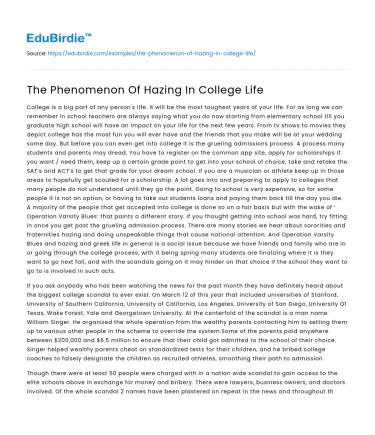Introduction
Hazing, a controversial and often dangerous practice, has been an enduring aspect of college life for centuries. While some perceive it as a rite of passage, others recognize its potential for harm. Defined as activities involving harassment, abuse, or humiliation as a method of initiation into a group, hazing has been documented in various forms across educational institutions globally. The persistence of hazing is attributed to the desire for camaraderie and belonging, yet its implications on individuals and communities are profound. This essay examines the phenomenon of hazing in college life, exploring its historical context, psychological and sociological impacts, and the ongoing efforts to mitigate its prevalence. By addressing counter-arguments and presenting real-life cases, this analysis seeks to offer a comprehensive understanding of why hazing continues and the measures necessary for its eradication.
Historical Context and Evolution of Hazing
The practice of hazing dates back to ancient times, with roots in military and religious rituals designed to test loyalty and endurance. In the context of college life, hazing has evolved from benign pranks to more severe forms of initiation. Historically, fraternities and sororities have been the most visible practitioners of hazing, often justifying it as a means to strengthen bonds and foster unity among members. Theodore Roosevelt, during his time at Harvard, described hazing as an "unpleasant but necessary custom" to weed out the weak (Nuwer, 2004).
Save your time!
We can take care of your essay
- Proper editing and formatting
- Free revision, title page, and bibliography
- Flexible prices and money-back guarantee
Despite the romanticized view of hazing as a tradition, its transformation over the years has led to increasingly hazardous activities. The tragic death of Timothy Piazza at Penn State University in 2017, following a fraternity hazing event, highlighted the lethal risks associated with such practices (Flanagan, 2018). This incident, among others, has prompted legislative actions and institutional policies aimed at curbing hazing. However, the clandestine nature of these activities and a culture of silence often impede enforcement efforts, perpetuating a cycle of abuse and impunity.
Transitioning from historical analysis to contemporary implications, it is crucial to understand how hazing practices impact the psychological well-being of students. The shift from traditional to more dangerous forms of hazing presents new challenges for colleges and universities striving to protect their students and uphold their reputations.
Psychological and Sociological Impacts
The psychological ramifications of hazing are significant, affecting both victims and perpetrators. For victims, hazing can lead to trauma, anxiety, depression, and in severe cases, post-traumatic stress disorder (PTSD). A study conducted by Allan and Madden (2008) found that 55% of college students involved in clubs, teams, and organizations experienced hazing, with many reporting feelings of shame and isolation. The pressure to conform and fear of ostracization often compel students to endure these harmful practices, exacerbating mental health issues.
From a sociological perspective, hazing perpetuates a power dynamic wherein upperclassmen exert control over new members, reinforcing social hierarchies within college organizations. This dynamic fosters an environment where abusive behavior is normalized and perpetuated. Sociologist Michael Kimmel (2010) argues that hazing rituals reinforce toxic masculinity, as they often involve tests of endurance, alcohol consumption, and humiliation designed to prove one's manhood.
Moreover, the impact of hazing extends beyond individual participants, affecting the broader campus community. The normalization of such practices can contribute to a culture of violence and discrimination, undermining efforts to create inclusive and safe educational environments. As we delve into counter-arguments, it becomes evident that addressing hazing requires a multifaceted approach that considers both the individual and systemic factors at play.
Counter-Arguments and Mitigation Efforts
Proponents of hazing often argue that it fosters a sense of unity and loyalty among members, citing traditions that have been passed down through generations. They claim that shared experiences, even those involving hardship, can create lasting bonds. However, critics contend that the negative impacts of hazing far outweigh any perceived benefits. The case of the Massachusetts Institute of Technology's (MIT) Phi Gamma Delta fraternity, where a student died after consuming excessive alcohol as part of a hazing ritual, underscores the potential for these practices to result in tragedy (Nuwer, 2018).
Efforts to mitigate hazing have taken various forms, from legal interventions to educational campaigns. Many states in the U.S. have enacted anti-hazing laws, imposing severe penalties on individuals and organizations found guilty of such practices. Educational institutions have also implemented awareness programs aimed at educating students about the dangers of hazing and promoting alternative methods of team-building and initiation.
Despite these measures, the persistence of hazing points to the need for a cultural shift within college communities. Encouraging open dialogue, empowering bystanders to intervene, and fostering environments where diversity and respect are prioritized are essential steps toward eradicating hazing. Transitioning to the conclusion, it is clear that collective responsibility and sustained efforts are crucial in addressing this complex issue.
Conclusion
In conclusion, hazing remains a pervasive and troubling aspect of college life, with deep-rooted historical origins and significant psychological and sociological impacts. While some view it as a tradition that fosters camaraderie, the potential for harm and the perpetuation of toxic power dynamics cannot be ignored. The tragic outcomes of hazing incidents underscore the urgent need for comprehensive strategies to address and prevent these practices.
Efforts to combat hazing must involve collaboration among students, faculty, and policymakers, with a focus on fostering inclusive and respectful campus cultures. By challenging the normalization of hazing and promoting alternative forms of initiation, colleges can create safer and more supportive environments for all students. Ultimately, the eradication of hazing requires a commitment to change and a collective endeavor to prioritize the well-being and dignity of every individual within the academic community.






 Stuck on your essay?
Stuck on your essay?

